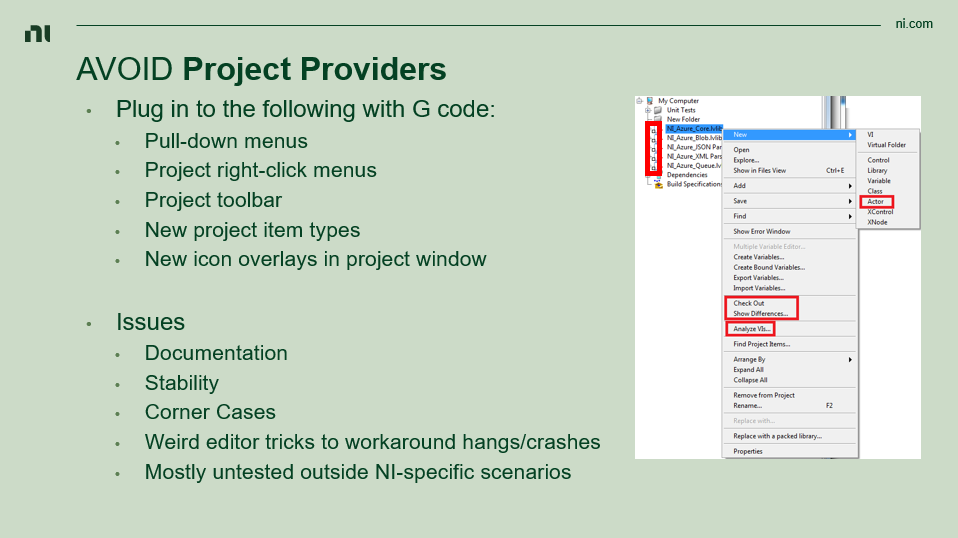Leaderboard
Popular Content
Showing content with the highest reputation on 05/14/2022 in all areas
-
No no. That is only one part of the problem and not the biggest one. The biggest problem is providing a callback function pointer that is matching exactly what the library expects. If you compile a C source code that implements that function then you can let the C compiler do all that work, but I was under the impression that you were looking for a solution that avoids the need to have the end user of the solution to compile a C code file that has to be also specifically adapted to the callback interface that library expects. You need to have a memory pointer that can be used as function pointer and that provides a stack frame that is exactly compatible to the expected interface from the library you want to pass this pointer to. On the other side you need an interface that can adapt to the data type that your PostLVUserEvent() needs. By fixing this PostLVUserEvent() interface to one or two datatypes, you solve one of the problems but you still need to provide an adaptable function pointer that can match the function interface of the library for that callback pointer. And that is were C itself simply won't help you. Why should it try to do that? The C compiler is much better at figuring this out so why spend time to develop a standard that lets you do C compiling at runtime? Yes such libraries exist but that is not something a C compiler would ever consider supporting itself. Therefore variadic and pack extension were never developed for such use cases. and simply couldn't help with that. If you don't want to have a C compiler involved in the end user solution, you need a way to express your callback function interface in some strict syntax and a translation layer that can comprehend this interface description and then prepare a call stack frame and function prolog and epilog to refer to that stack frame and at the end clear up the stack frame properly too. That's the really hard part of your proposed solution. And the user of such a solution also needs to understand the description syntax to have your library build the correct stack frame and function epilog and prolog for that function pointer. Then you could have it call into a common function that receives the stack frame pointer and stack parameter description and translate that into whatever you need. This translation from anything to something else that LVPostUserEvent() needs, can be as elaborate as you want. It's not really very difficult to do (if you really know C programming and twiddling with bits and bytes efficiently of course), just a lot of work as you need to be prepared to handle a lot of data types on either side of that translation. You can reduce that complexity by specifying that the LVPostUserEvent() interface always has to be one and only one specific datatype but it is still a lot of work. This second part of translating a known stack frame of datatypes is in complexity similar to those LabVEW libraries out there that parse a variant and then try to convert it back into LabVIEW native data themselves. It's complicated, a lot of work and I seldom saw a library that did a really decent job at that beyond serving some basic datatypes but it can be done with enough determination. The REAL problem is however to let the user build a callback pointer that matches the expected calling interface perfectly without having him to execute a C compiler. This is only really possible with a library like libffi or similar, if you do not intend to go and start playing assembler yourself. There is no compiler support for this (unless maybe if you would like to repurpose llvm into your own library) since it makes little sense to let the compiler externalize its entire logic into a user library. The gcc developers have no interest to let a user create another gcc like thing, not because they shy the competition but because the effort would be enormous and they have enough work to churn on to make the compiler work well and adapt to ever increasing standard proposals. libffi allows to build callback pointers, but it needs of course a stack frame description and other attributes such as calling convention to be able to do so. And it needs a user function pointer to which it can forward control after it has unraveled the stack and which after this function has done its work it will execute its epilog to do any stack cleanup that may be required. If LabVIEW had an officially documented way to call VIs from exernal code, I would have long ago tried to do something like that, as it would be very handy to have in Lua for LabVIEW. Currently Lua for LabVIEW does all kinds of very involved gymnastics that also involve a background LabVIEW VI deamon to which the shared library passes any requests from the Lua code to execute VIs (well the VIs are really registered in Lua as simply other Lua functions so the Lua script has no idea that it is effectively calling a LabVIEW VI), which in turn then calls that VI from its LabVIEW context and passes any return values back. Since this is such a roundabout way of doing things it has to limit the possibilities. A LabVIEW VI can execute Lua code which calls back into LabVIEW VIs but after that it gets to complicated to manage the necessary stack frames across calling environments and the Lua for LabVIEW shared library has specific measures to detect such calls and simply forbids them categorically for any further round turn. It also has a very extensive function to translate Lua data to LabVIEW data based on the LabVIEW typedescriptor and an according reverse function too that handles almost all the data types that LabVIEW and Lua know. But I can't directly invoke a VI from within the external code since there is no documented function to do so. Yes I know that there are functions that can do it but without a full documentation about them I will not embark on using them in any project that will leave my little office ever. Basically your desired solution has two distinct areas that need a solution: 1) Create a function pointer with correct prolog and epilog according to some user specified interface description that will then call the function in 2) 2) Create a function that receives the stack frame information and datatype description and then uses another user specification that defines which of those stack frame parameters should be used and how and in what kind of datatype they should be translated to pass to PostLVUserEvent() 1) can be solved by using libffi, but it is not going to be easy. libffi is anything but trivial to use but then it does solve a problem that is also anything but common in programming. 2) is simply a more or less complex function that can be developed and tested independently from the rest. It is NOT the big problem here, just quite a bit of work. If the callback allows to pass a user data pointer, you can repurpose that to pass all the information from about how the stack frame is build and how to translate from the stack frame to the PostLVUserEvent() from the setup function that prepares the callback pointer through this pointer. If it has not such a user data pointer , you have an additional problem of how to provide the necessary information to your translation function. It may be possible to prepare the callback pointer with some extra memory area to hold that pointer such as prepend it directly in front of the actual entry point and dereference it with a negative offset inside the callback but that is going to be highly hacky and has quite a big chance off breaking on some platforms, CPUs or OSes.1 point
-
You are right. By the way that is the example, that I used a while ago to study PostLVUserEvent just like you do. But you don't need the string manipulations from there. You're going to pass pBuffer pointer to LabVIEW with PostLVUserEvent function inside your callback and you should be done. Looking at your C code I see, you're doing more or less good. But you don't even need to implement the main function, because all the work with the cameras is made in your LabVIEW application entirely. You could remove that code at all. Besides the callback function you'll need one extra helper function, that would set your User Event refnum to some global variable in your DLL. That's needed, because when you'll want to call PostLVUserEvent, you'll need that refnum and you could take it out of that global variable. Something like this: #include <stdio.h> #include <iostream> #include <time.h> #include "Windows.h" #include "extcode.h" using namespace std; LVUserEventRef *pUE; void SendEvent(LVUserEventRef *rwer) { pUE = rwer; } void CALLBACK g_DataCallBack(LONG lRealHandle, DWORD dwDataType, BYTE *pBuffer, DWORD dwBufSize, void *pUser) { //your callback code here // ... //PostLVUserEvent(*pUE, (void *)&pBuffer); is here as well } Likely will require some small fine-tuning like adding extern "C" { ... } to escape functions name mangling.1 point
-
1 point




